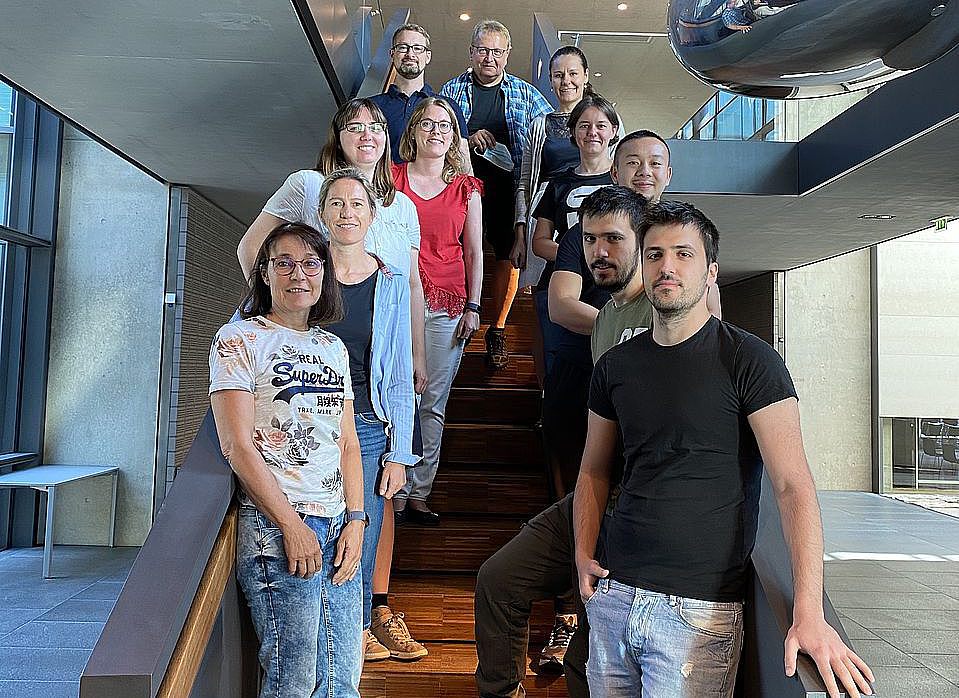IKK2/NF-κB Activation in Astrocytes Reduces amyloid β Deposition: A Process Associated with Specific Microglia Polarization
Yang, S., Magnutzki, A., Alami, N. O., Lattke, M., Hein, T. M., Scheller, J. S., Kröger, C., Oswald, F., Yilmazer-Hanke, D., & Wirth, T
Cells. 2021 Oct 6;10(10):2669.doi: 10.3390/cells10102669
Age-Related Gliosis Promotes Central Nervous System Lymphoma through CCL19-Mediated Tumor Cell Retention.
O'Connor T, Zhou X, Kosla J, Adili A, Garcia Beccaria M, Kotsiliti E, Pfister D, Johlke AL, Sinha A, Sankowski R, Schick M, Lewis R, Dokalis N, Seubert B, Höchst B, Inverso D, Heide D, Zhang W, Weihrich P, Manske K, Wohlleber D, Anton M, Hoellein A, Seleznik G, Bremer J, Bleul S, Augustin HG, Scherer F, Koedel U, Weber A, Protzer U, Förster R, Wirth T, Aguzzi A, Meissner F, Prinz M, Baumann B, Höpken UE, Knolle PA, von Baumgarten L, Keller U, Heikenwalder M.
Cancer Cell. 2019 Sep 16;36(3):250-267.e9. doi: 10.1016/j.ccell.2019.08.001. PubMed PMID: 31526758.
Elevated β-cell stress levels promote severe diabetes development in mice with MODY4.
Trojanowski B, Salem HH, Neubauer H, Simon E, Wagner M, Dorajo R, Boehm BO, Labriola L, Wirth T, Baumann B.
J Endocrinol. 2019 Nov 1. pii: JOE-19-0208.R1. doi: 10.1530/JOE-19-0208.
IKK2/NF-kB signaling protects neurons after traumatic brain injury.
Mettang M, Reichel SN, Lattke M, Palmer A, Abaei A, Rasche V, Huber-Lang M, Baumann B, Wirth T.
FASEB J. 2018 Apr;32(4):1916-1932. doi: 10.1096/fj.201700826R.
NF-kB activation in astrocytes drives a stage-specific beneficial neuroimmunological response in ALS.
Ouali Alami N, Schurr C, Olde Heuvel F, Tang L, Li Q, Tasdogan A, Kimbara A, Nettekoven M, Ottaviani G, Raposo C, Röver S, Rogers-Evans M, Rothenhäusler B, Ullmer C, Fingerle J, Grether U, Knuesel I, Boeckers TM, Ludolph A, Wirth T, Roselli F, Baumann B.EMBO J. 2018 Jun 6. pii: e98697. doi: 10.15252/embj.201798697.
Transient IKK2 activation in astrocytes initiates selective non-cell-autonomous neurodegeneration.
Lattke M, Reichel SN, Magnutzki A, Abaei A, Rasche V, Walther P, Calado DP, Ferger B, Wirth T, Baumann B.;
Mol Neurodegener. 2017 Feb 13;12(1):16. doi: 10.1186/s13024-017-0157-0.
NF-kB-mediated astrocyte dysfunction initiates neurodegeneration.
Lattke M, Reichel SN, Baumann B.
Oncotarget. 2017 May 31;8(31)

